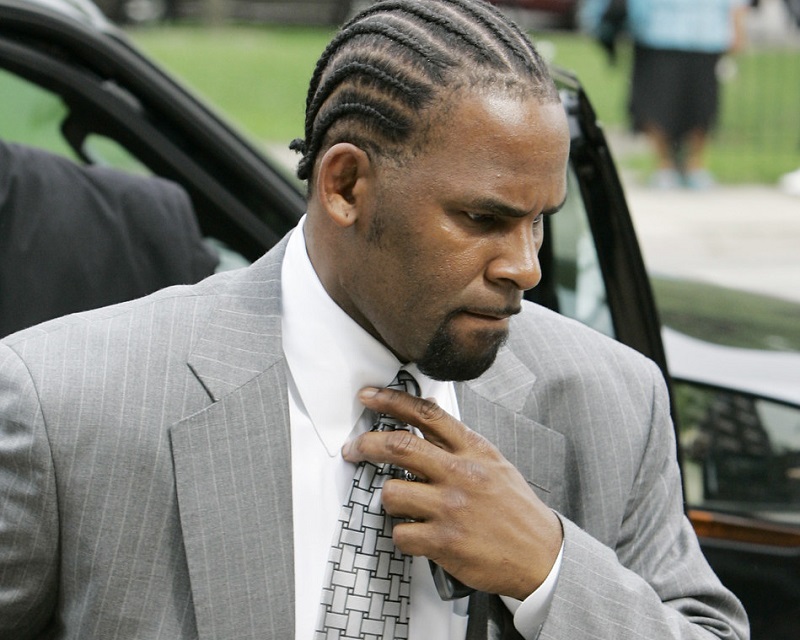
His former cellmate has come forward with alarming allegations about the rapper’s treatment while incarcerated.
If you haven’t heard, R. Kelly is reportedly facing serious health issues and threats to his life while serving his sentence.
In June 2025, his legal team filed a bombshell motion in Chicago federal court, seeking his immediate release to home detention.
They claimed that members of the Aryan Brotherhood, alongside officials from the Bureau of Prisons, were allegedly plotting to murder him.
This shocking revelation raises questions about the integrity of the prison system and the safety of high-profile inmates like Kelly.
The motion filed by Kelly’s attorney, Bo Brinley, included a sworn statement from a terminally ill inmate named Mcquille Glenn Stein.
Stein alleged that he was approached by prison officials who offered him freedom in exchange for Kelly’s murder.
According to Stein, he was told that Kelly was about to expose damaging information about the Bureau of Prisons and the Department of Justice.
The alleged plot claimed that this information was so serious that eliminating Kelly was deemed necessary before he could spill the tea.
Stein’s declaration highlighted a disturbing pattern of corruption within the federal prison system, suggesting that such plots are not isolated incidents.

In a twist of fate, Stein reportedly had a change of heart and chose to inform Kelly about the murder plot instead of carrying it out.
This decision could have serious implications, as it suggests a systemic issue where prison officials may be directing gang members to commit violent acts.
Kelly’s attorney claims that this type of arrangement happens frequently, indicating a troubling level of corruption that extends beyond Kelly’s case.
Moreover, the situation escalated when Kelly’s legal team learned of a second Aryan Brotherhood member who was also allegedly directed to kill both Kelly and Stein.
Discussions about using poison in the food hall and other violent methods were reportedly underway, adding to the urgency of the situation.
Following the filing of the emergency motion, Kelly was moved to solitary confinement at FCI Butner, where conditions have reportedly worsened.
His legal team argues that this move was retaliation for exposing the alleged murder plot rather than a protective measure.
Kelly has expressed fears about eating prison meals or using commissary goods, believing they may be poisoned.
His health has been a significant concern, as he suffers from diabetes and has faced complications like blood clots.
In fact, Kelly’s legal team alleged that he suffered an overdose due to improper medication administered by prison staff.
This incident led to a frightening medical emergency, where Kelly lost consciousness and had to be rushed to a nearby hospital.
The allegations surrounding R. Kelly’s treatment in prison raise broader questions about the treatment of high-profile inmates.
His former cellmate, Ronnie Bow, has drawn connections between Kelly’s situation and other high-profile cases, suggesting a pattern of systemic violations of human rights.
Bow argues that Kelly’s case reflects a larger issue of how powerful individuals are targeted within the justice system.
Despite the serious allegations, Kelly’s legal battles in traditional courts have largely been unsuccessful.

The Second U.S. Circuit Court of Appeals upheld Kelly’s conviction and 30-year sentence, rejecting claims of inadequate evidence and prosecutorial misconduct.
In a desperate move, Kelly’s legal team has appealed directly to President Donald Trump for a presidential pardon.
They argue that Kelly is a victim of prosecutorial misconduct and that his case exemplifies the corruption within the justice system.
This appeal appears strategic, drawing parallels to Trump’s recent commutation of the sentence of Larry Hoover, a notable figure in the Gangster Disciples.
However, as of the latest reports, no pardon has been granted, leaving Kelly’s future uncertain.
To understand the current situation, we must revisit how R. Kelly ended up behind bars in the first place.
The allegations against him date back to 1994 when he married 15-year-old Aaliyah in a secret ceremony, raising immediate red flags.
As the years passed, numerous women came forward with allegations of inappropriate conduct, but Kelly’s fame and wealth seemed to shield him from consequences.
The turning point came in 2019 with the release of the documentary “Surviving R. Kelly,” which exposed the depth of his alleged abuses.
This documentary prompted renewed legal scrutiny, leading to multiple charges against him, including racketeering and sexual exploitation of minors.
As of now, R. Kelly remains in solitary confinement, facing serious allegations of threats to his life and deteriorating health.
His situation highlights the complexities of the justice system and the potential for corruption at the highest levels.
While Kelly’s fall from grace has been well-documented, the implications of his case extend far beyond one man’s story.
It raises critical questions about the treatment of powerful individuals within the justice system and the lengths to which some may go to silence those who know too much.
As we await further developments, the world watches closely, eager to uncover the truth behind R. Kelly’s tumultuous journey through the penal system.
If you found this story intriguing, be sure to check out more articles that delve into the complexities of celebrity justice and the hidden truths of the entertainment industry.





